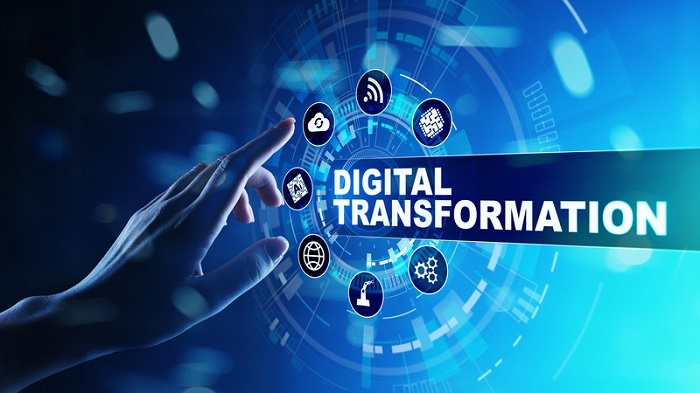
 Data Structure
Data Structure Networking
Networking RDBMS
RDBMS Operating System
Operating System Java
Java MS Excel
MS Excel iOS
iOS HTML
HTML CSS
CSS Android
Android Python
Python C Programming
C Programming C++
C++ C#
C# MongoDB
MongoDB MySQL
MySQL Javascript
Javascript PHP
PHP
- Selected Reading
- UPSC IAS Exams Notes
- Developer's Best Practices
- Questions and Answers
- Effective Resume Writing
- HR Interview Questions
- Computer Glossary
- Who is Who
The Impact of Digital Transformation on People Strategy
The major contributing factor to the success of digital transformation in an organizational structure is the attitude of the people involved. The employees of an organization can make or break the company. With this context in mind, it becomes extremely critical for businesses to adapt or improvise their people management strategy in the same manner. Digital transformation creates havoc for the employees involved; it ultimately benefits the employees only, but a lot is lost in between.
In this article, we will be diving deep into how organizations can change their people management strategy to suit digital transformation and how some of the most prominent companies are doing the same.
Digital Transformation and Companies

Digital transformation is a process through which a company can adapt itself to the latest trends. be it selling online, removing mundane activities, focusing more on strategy building, improving customer experiences, developing better products or services, and others. Companies today are digitalizing all four Ps of marketing, i.e., product, price, place, and promotion.
Effects of Digital Transformation on Business People Strategy
It is very critical for businesses to ensure that the employees of the organization are aligned with the digital transformation and are supportive of it. Without the consensus of the employees, we generally see a lot of attrition, loss of productivity, unruly behavior among the employees, and firing situations. Some of the strategies to align employees with digital transformation could be ?

It is time to change the way we engage with employees ? With digital transformation, the company will be able to work in a work-from-home or hybrid model. This will result in less interaction among employees from various fields and a detachment from the company and the work. A disengaged employee will not give their 100%, and the organization will lose out on a lot of potentials, so it has become essential for companies to try out new engagement activities. Companies are coming up with a lot of games, ice-breaking sessions, and applications in which they can track the engagement level of employees, and hence, if you are transforming, you would have to adapt to the same.

Google ? Google is a globally recognized brand, and the company makes every effort to ensure that its employees are engaged and giving their all. In the Google office, you will see in-house swimming pools, gyms, nap pods, professional masseuses, table games, health checkup centers, and all three meals of the day. Employees only have to focus on getting the work done, and every other need is taken care of by Google.

Continuous learning as a part of corporate culture ? since the business world is moving towards technology and digitalization every day, there are chances of becoming obsolete. Companies have to be on their toes, as well as their employees, to stay relevant and productive in this fast-paced world. Hence, it has become very critical for businesses to invest a lot of money in the learning of their employees. Various certifications and workshops can ensure that employees can develop themselves and take on interesting and more challenging roles when the need arises. This will also reduce the company's hiring costs.

Price Waterhouse Coopers (PWC) ? The company came up with the program "New World, New Skills" and is planning to invest around $3 billion in upskilling its employees. Here, the participants will learn how to leverage the latest technology, automation, and robotics.
Making data-driven decisions ? when it comes to people Since the company will be digitally transformed, gone are the days when the HR department would make decisions based on intuition and experience. While deciding upon the performance, rewards, and recognition of employees, companies should ensure that the decisions are data-driven. This will ensure transparency, and the employees will develop better relations with the company.

Job descriptions must include the technical terms ? The types of employees that the company will require in the pre-phase of digital transformation, post-phase of digital transformation, and during the phase of digital transformation are different. In the pre-phase, a company might need employees who are entrepreneurial, risk-takers, and change managers, while in the post-phase, the company will need someone who can manage both the AI and the humans involved. Because the recruitment department's operations will change dramatically, it is critical to update the job description and panel accordingly. Words like "AI," "machine learning," and "technologies" used in the company (such as "Angular," "React," "Java," "HTML," "CSS," "SAAS," "SCSS," ".NET," and others) can be included.
Change the training approach for the new hires ? Since the world is opening up globally and digitally, it has become important for businesses to upskill their employees both in terms of soft skills and hard skills. Companies have to ensure that the new hires receive proper training and at the same time have someone who can guide them on the application of the theoretical knowledge taught to them. Agile and DevOps are the basic technical skills that employees must be aware of. Companies should try to train their new hires for better strategic roles instead of menial labor.
Psychometric testing as part of the recruitment process, regardless of career level ? companies must assess the candidate's inner workings before hiring them for important or operational roles. Every candidate is going to be on their best behavior during the 30 or 45-minute interview session that happens three or at most four times. The psychometric test will help the recruiter understand the true nature of the candidate and, hence, decide whether it would be a good fit or not.
TCS, Infosys, Capgemini, Yes Bank, or Learning Mate ? You can go through the job description of the techno-functional managers of any company and you will find the mixture of JD discussed above.

Align the people ? Another important aspect that a company should ensure is that it conveys to its people the reason for the change, the outcome they are expecting, and hears their views on the same. They must believe that it is something they chose to improve themselves rather than something imposed by the company.
Digital transformation is needed because of the opening up of the market and the automation of processes, but what is critical for the implementation of this transformation is people. An organization has to give its best in order to ensure that its employees are aligned with the digital advancement of the company. With the strategies mentioned above, companies can ensure that people are in sync. Happy employees are productive employees, and with just some of the above-mentioned steps, a company can ensure that they have people moving forward with them toward the same destination.

